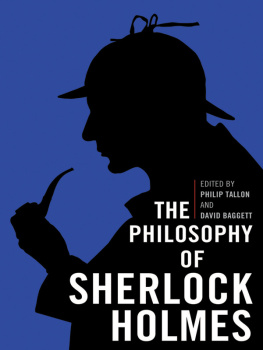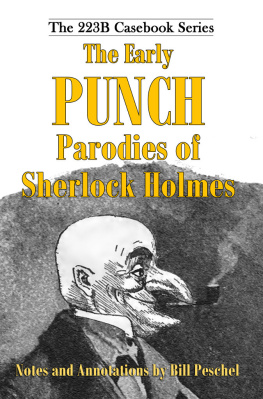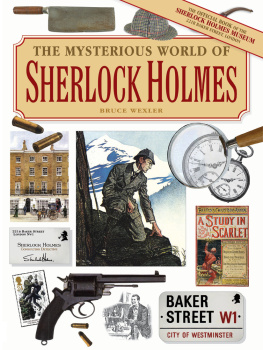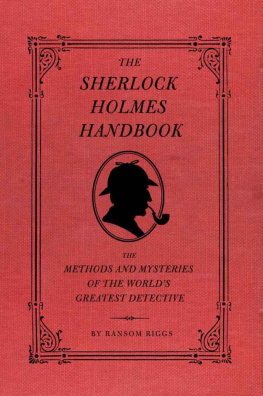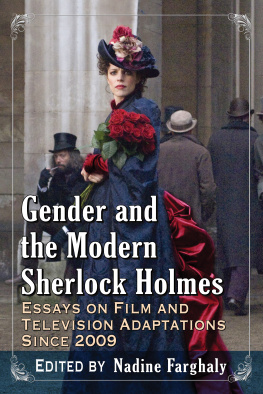Scholarly publisher for the Commonwealth, serving Bellarmine University, Berea College, Centre College of Kentucky, Eastern Kentucky University, The Filson Historical Society, Georgetown College, Kentucky Historical Society, Kentucky State University, Morehead State University, Murray State University, Northern Kentucky University, Transylvania University, University of Kentucky, University of Louisville, and Western Kentucky University.
All rights reserved.
The Philosophy of Sherlock Holmes / edited by Philip Tallon and David Baggett.
p. cm.
Includes bibliographical references and index.
ISBN 978-0-8131-3671-4 (hardcover : alk. paper) ISBN 978-0-8131-3687-5 (pdf)
1. Doyle, Arthur Conan, Sir, 18591930CharactersSherlock Holmes. 2. Holmes, Sherlock (Fictitious character) 3. Detective and mystery stories, EnglishHistory and criticism. 4. Philosophy in literature. 5. Private investigators in literature. I. Tallon, Philip. II. Baggett, David.
This book is printed on acid-free paper meeting the requirements of the American National Standard for Permanence in Paper for Printed Library Materials.
Manufactured in the United States of America.
INTRODUCTION
The Case of the Conan Doyle Conference
Philip Tallon and David Baggett
This volume came together at a special Sherlock Holmes colloquium, convened at the University of Bern, near the famous Reichenbach Falls. Despite the fearsome headlines and morbid details popular in the press coverage of the event, it was mostly a delightful and relaxing conference, with many fascinating papers on deep questions raised by Sir Arthur Conan Doyle's famous mysteries.
The location was lovely, with conference rooms that looked out over the falls where Holmes and Moriarty had their famous battle in The Final Problem. Fourteen esteemed scholars were present, and of the thirteen papers read (Dr. Tallon's not being read for obvious reasons), all were back-grounded by the soft, relaxing whoosh of the cataract as it fell into the pool belowthe same pool, of course, where the body of Dr. Tallon was found floating after he failed to appear for his session.
The papers presented are here reprinted in this volume in their original order, accompanied by notes about the conference.
In the first session, Dr. David Baggett's paper, Sherlock Holmes as Epistemologist, explored the intellectual virtues of Holmes that are conducive to good thinking, whether applied to solving a crime or the mystery of life. Rather than a myopic logic chopper devoid of emotion, as he is often characterized, Baggett argued that Sherlock Holmes exhibits traits that make the most ardent feminist epistemologist proud: passion, instinct, and artistry. These collectively comprise an expansive understanding of reason and rationality that yields not unjustified hubris but hard-won intellectual confidence and courage. Baggett's paper praised the role that intuition plays in understanding the world.
After his paper on the use of abduction, Dr. Baggett fell silent for a long time, as if realizing something.
Next, David Rozema discussed a strange case in the Holmes canon, where Holmes's hatred of a blackmailer seems to send him over the line from hero to the ranks of the criminal class. In Not the Crime, but the Man: Sherlock Holmes and Charles Augustus Milverton, Rozema argued that though Holmes's behavior is patently illegal, and by many measures immoral, virtue ethics offers a framework for assessing Holmes's actions that casts them in a more promising light.
Kevin Kinghorn's paper proved a fascinating analysis of the nature of deception. Considering and casting to the side insufficient definitions, Kinghorn arrived at a solid definition of deception. Adding considerable interest to Kinghorn's essay was his extensive use of examples drawn from the Conan Doyle stories. Perhaps most interestingly, however, was how Kinghorn's definition of deception illuminated the relationship between Holmes and Moriarty.
Later, Dr. Kinghorn reported to the police hearing Dr. Baggett and Dr. Tallon arguing in the hallway over missing conference funds. The argument ended when Dr. Baggett stormed off.
During the lunchtime keynote speech, Massimo Pigliucci presented a paper titled Sherlock's Reasoning Toolbox, which examined the powers and problems surrounding deduction and induction. Though Holmes is sometimes chided for being less than precise with his supposedly airtight logic, Pigliucci affirmed Holmes's more inductive, probabilistic method.
At the end of the luncheon, Dr. Tallon suddenly began complaining of stomach pains and quickly left the dining hall. When the conference attendees made their way to hear his paper after lunch, a hastily scrawled note on the door indicated that the paper was moved to the next day. The paper, as printed in the conference schedule, was to be an examination of Aristotle's philosophy of friendship with reference to the friendship of Holmes and Watson, although the amendment to the schedule announced the paper was now called Watsons, Adlers, Lestrades, and Moriarties: On the Nature of Friends and Enemies. Enemies, it seemed, had been added as a subject for examination as well.
Instead of Tallon's paper, Kyle Blanchette presented his essay, Eliminating the Impossible, which discussed Holmes's sometime investigation of the supernatural in The Hound of the Baskervilles and in a recent Sherlock Holmes film. By using Holmes's investigation of an eerie curse and rumors of a resurrection from the dead, Blanchette asked whether it is ever reasonable to keep open the supernatural as a possible cause of events. This provided a natural way for Blanchette to discuss issues surrounding miracles and other issues in the philosophy of religion.
The only strange event of the session happened when Blanchette sat in the presenter's chair and the chair collapsed, sending him backward and nearly impaling him on a decorative sculpture. If Blanchette had been just an inch taller, the attendees agreed, it could well have punctured his skull.
Andrew Terjesen's paper discussed the controversial death of Sherlock Holmes in Sir Arthur Conan Doyle's The Final Problem. This was an event that caused so much ire among fans at the time that Conan Doyle received more threats and hate mail than most real-life murderers. Terjesen posed a fascinating question, unique in the ethical literature: Was it morally wrong to kill off Sherlock Holmes? Drawing on aesthetics, ethics, and the literature surrounding copyright, Terjesen considered both sides of the equation.
After Terjesen's presentation, the session was briefly interrupted when gunshots were heard outside the hall, although on inspection, the sounds were discovered to have come from firecrackers, probably left by local hooligans. When everyone returned to the hall, however, the projector was no longer functioning, forcing everyone to relocate to the south conference room. Later, police found footprints and a pair of binoculars in the bushes on the south side of the building.

